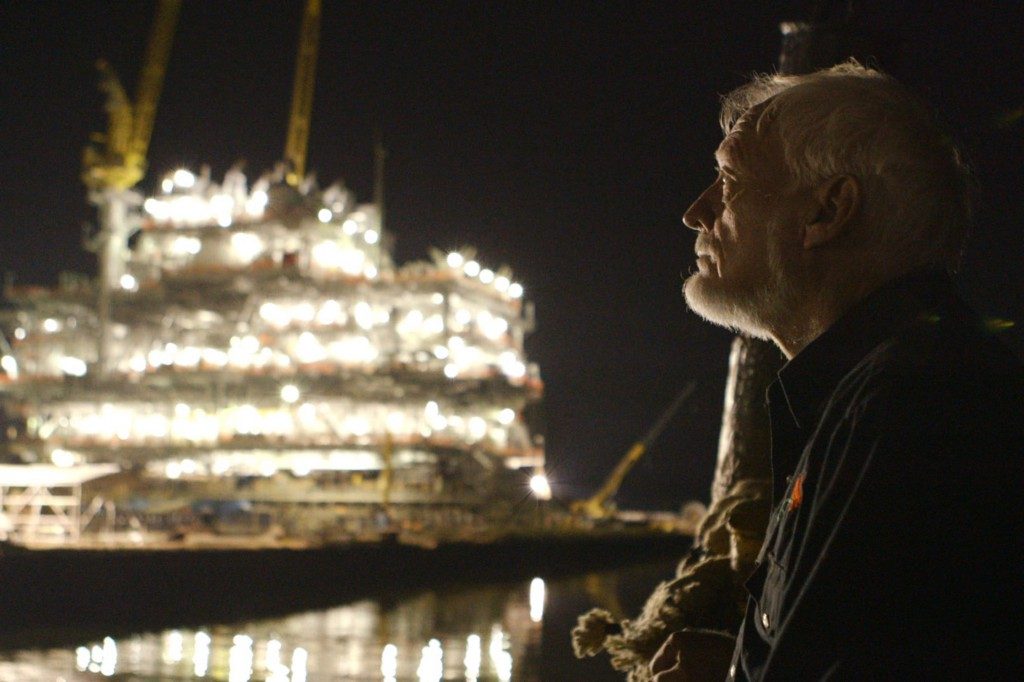Alabama native Margaret Brown is a Peabody Award-winning director whose last documentary feature, The Order of Myths, received the Truer Than Fiction Award at the 2009 Independent Spirit Awards and a nomination for Best Documentary. Her first feature, Be Here to Love Me: Townes Van Zandt, was released theatrically worldwide. (Press materials)
The Great Invisible will debut at SXSW on March 9.
Please give us your description of the film.
The Great Invisible is a documentary about the Deepwater Horizon disaster when the oil rig exploded in the Gulf of Mexico on April 20, 2010, killing 11 workers and caused the worst oil spill in American history. The explosion still haunts the lives of those most intimately affected, though the story has long ago faded from the front page. At once a fascinating corporate thriller, a heartbreaking human drama and a peek inside the walls of the secretive oil industry, The Great Invisible is the first documentary feature to go beyond the media coverage to examine the crisis in depth through the eyes of oil executives, survivors and Gulf Coast residents who experienced it first-hand and then were left to pick up the pieces while the world moved on.
What drew you to this story?
I’m from Alabama, where the spill hit pretty hard. In the weeks after the spill, my father sent me pictures of his house in Mobile Bay surrounded by boom, which were the orange barriers BP used to try and prevent oil from seeping into the marshes and reaching the shoreline. For me, it was so jarring to see this place that was so familiar, as it prepared for the worst. When I talked to people I realized there was a collective sense of powerlessness in the face of the incoming oil, and I thought the one thing I could try and do to help was to make something about it.
Of course, the film started there and turned into something much larger, as I grew interested also in the South’s (and the nation’s) relationship to the global oil economy.
What was the biggest challenge in making the film?
It was the stamina it took to make a film over a four-year period. Once I raised the money for the film, my life was centered around learning as much as I could about the industry and the oil spill, all while covering the lives of the subjects who lived across a wide swath of the Gulf Coast and beyond. It’s ironic for a film that contains a certain critique of the oil industry — I spent so much of the time making it driving from location to location in my car.
What advice do you have for other female directors?
It’s probably the same advice I’d give anyone: Be very tenacious. The odds are stacked against you. If you are a woman, it’s statistically a lot more so, but just being a filmmaker as a career is pretty ambitious to begin with.
I would also just advise anyone to have a sense of humor about yourself and your work. It’s crazy that we get to do this for a living, so enjoy it.
What’s the biggest misconception about you and your work?
I’ve never thought about that, I have no idea!
Do you have any thoughts on what are the biggest challenges and/or opportunities for the future with the changing distribution mechanisms for films?
I don’t really think about this so much. I probably should. I’m perhaps naive to think that good storytelling will always be popular. I hope collective cinematic experiences don’t disappear. Seeing something with a group of people in a darkened room is so magical. But I’m also curious about new ways to experience art, so bring on these new distribution models.
Name your favorite women directed film and why.
I loved Agnes Varda’s Cleo from 5 to 7 for its treatment of time. It always feels fresh. And then I also admire Varda’s documentary The Gleaners and I and the sweetness of it. Both of these films are edited so courageously. I love the range of her work and her ability to move from narrative to documentary with success in both. I also loved the eerie green-blue world that Jane Campion created in Top of the Lake.
Watch The Great Invisible trailer:
https://medium.com/media/ee6d323d287c5e0e342fb8917b96d788/href







